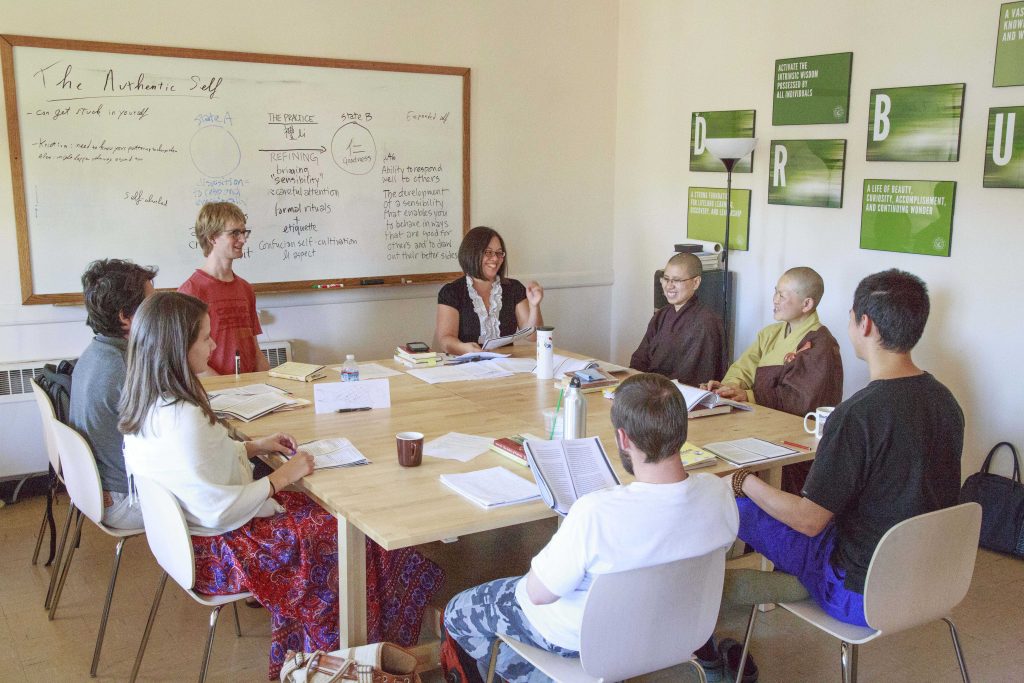Statement on Shared Inquiry
Radically free and radically responsible
The individual student, each in his or her own way, needs to question and be questioned. The pedagogical goal—the rationale for the texts, curricular strands, writing, discussion, supplementary lectures, laboratory materials, contemplative exercises, and language tutorials—all center on arriving at one goal: the students’ knowing for and through themselves.
Nor can teachers presume to be final authorities. In this system of learning, teachers at best help clarify the issues, demonstrate the methods, serve as sounding boards and mirrors that reflect, and thereby indirectly facilitate the student’s own understanding. As faculty, they eschew the more common role to “profess,” to interject their expertise, however well-intentioned. Instead, they allow for students to wonder, even to be a bit bewildered, as they struggle to figure things out for themselves.
Casting the teacher as a guide rather than a director of the students’ learning process reflects an ancient pedigree both East and West. Here, good teaching does not tell the students what they need to have or know, but helps them explore what it is that’s worth wanting, and important, to know. The primary function of the teaching faculty and the university itself, then, is to encourage and assist students in the bittersweet task of answering these important questions for themselves. This is what is meant by “self-cultivation.”
In other words, the individual student, each in his or her own way, needs to question and be questioned. Neither the text, nor the teacher, nor the student alone can presume to be “the measure of all things.” All three mutually sound and respond. All need to be actively present, yet each must challenge and be challenged. The texts in conjunction with the curious student and gently prodding teacher form a triangle of constructive tension, a delicate balance of “authorities” that together draw out latent knowledge into active awareness.

A dialectical discussion-driven instruction method is designed to avoid predigested, passive learning, where the student is primarily concerned with what he or she “needs to know for the test.” Instead, it is devised to stimulate thought, foster new ideas and insights, and create a living dialogue between the students and the texts. Such an open give and take allows students to reanimate classical texts and creatively bring them into a modern context. It is thus both an exercise in intellectual freedom as well as a test to the claim that these works resonate beyond borders of time and place.
To summarize, the pedagogical goals—the rationale for the texts, curricular strands, writing, discussion, supplementary lectures, laboratory materials, contemplative exercises, and language tutorials—all center on arriving at one outcome: the students’ knowing for and through themselves. The text, teacher, and student form a triangular relationship of inquiry where authority rests with not one exclusively but through all in concert, even at times in tension. This pedagogy depends a great deal on the initiative and activity of the students for learning. With ardent and engaged students, the classroom atmosphere becomes catalytic, not didactic; teaching aims at drawing out rather than pouring in.
The ultimate goal of such inquiry is to develop men and women who can stand on their own. By directly wrestling with the texts and, by extension, their own thoughts, feelings, and tendencies, they acquire a hard-won confidence and clarity that serve as a foundation for engaging life to its fullest. Amid all the conflicting desires and complex issues they will encounter, such individuals can discern, decide, and act upon what is true to themselves and responsible to others.
In this way, the goal of a liberally educated person is exercised and exemplified in vivo, all along and throughout their learning experience. We adhere to the dictum “as you hope to arrive, so proceed.” If the goal is responsible, thoughtful, and creative citizens, then in their formative experience, students must learn how to take responsibility for their own development at every turn. The Buddhist view of a liberated and enlightened individual and the Western view of a liberally educated and responsible person clearly align on this goal. In both views, the individual is radically free and radically responsible.